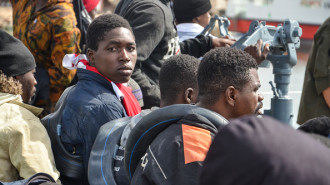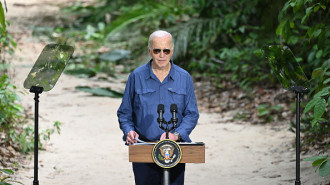Egypt LGBTQ+ activist arrested, tortured for flying Pride flag dies in exile
Egypt LGBTQ+ activist arrested, tortured for flying Pride flag dies in exile
Social media users mourned the passing of Egyptian LGBTQ+ activist Sarah Hegazi, who was arrested and tortured by authorities for flying a rainbow flag at a concert.
3 min read
Sarah Hegazi was 30 years old at the time of her passing. [Instagram]
An Egyptian LGBTQ+ activist who was arrested and tortured for flying the Pride flag at a concert in her home country has died by suicide on Saturday while in exile in Canada, according to grieving social media posts.
Sarah Hegazi, who identified as a gay woman, passed away nearly three years after her arrest. She was 30 years old, according to the posts.
In 2017, Hegazi was among dozens arrested after raising the rainbow flag at the crowded Cairo concert of progressive Lebanese indie band Mashrou' Leila, whose frontman is openly gay.
The mass arrests were deemed to be Egypt's largest crackdown against its LGBTQ+ community in recent years.
Hegazi was arrested at home by a group of armed security forces a week after the concert.
"They were a force really, a large number of officers with weapons coming to get one woman," she told Deutsche-Welle in 2018.
Out of all the detainees, Hegazi, then 28, and 21-year-old Ahmed Alaa faced the most serious charges.
|
In a 2018 NPR interview, Hegazi said the state viewed her as a "criminal" who was "seeking to destroy the moral structure of society".
Authorities at a police station incited other female detainees to grope her, she told NPR. Her lawyer said she was questioned about her virginity and asked why she no longer wore a headscarf.
Hegazi spent 3 months in a women's prison while awaiting trial. She was subjected to over a week of solitary confinement, was prevented from exercising outdoors and shared a cell with inmates who were ordered not to speak to her.
Hegazi told Deutsche-Welle she was also "violently assaulted" and electrocuted during the ordeal.
After her release on bail, Hegazi was diagnosed with severe depression and told NPR she suffered from a "very intense, serious case" of post-traumatic stress disorder (PTSD). She said she has experienced hallucinations of "people who are nice, who discuss things and don't attack" her.
She also mentioned having attempted to end her life.
Hegazi and Alaa each fled to Canada, where they were granted asylum. Both had relocated to Toronto.
Hegazi told NPR her decision to fly the flag in conservative Egypt was "an act of support and solidarity - not only with the [Mashrou' Leila] vocalist but for everyone who is oppressed".
"I did it because of my sexuality," she told Deutsche-Welle. "I was declaring myself in a society which hates all that is different from the norm."
Before her tragic passing, Hegazi allegedly left a note that read: "To my siblings, I have tried to find salvation and I failed, forgive me. To my friends, the journey was cruel and I am too weak to resist, forgive me. To the world, you were cruel to a great extent, but I forgive you."
Egypt does not explicitly criminalise sexual or gender identities, but has repeatedly persecuted its LGBTQ+ community under vague morality laws.
Egyptian authorities have used tactics widely concemned by human rights groups, such as arbitrary arrests, forced anal examinations and sting operations on gay dating applications.
Follow us on Facebook, Twitter and Instagram to stay connected







 Follow the Middle East's top stories in English at The New Arab on Google News
Follow the Middle East's top stories in English at The New Arab on Google News


